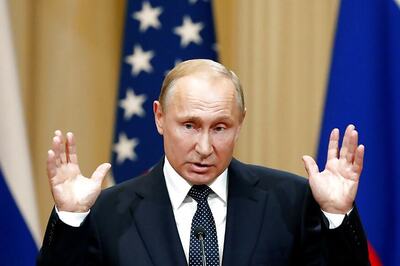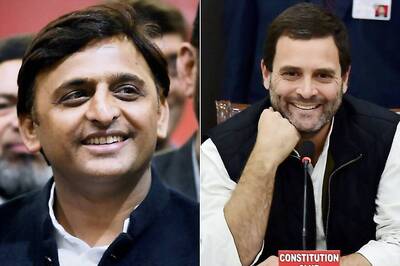
views
Hong Kong's political unrest took another dark turn Sunday when a driver mowed down protesters with a taxi cab and a man was beaten bloody by a mob, video shows.
The violence took place as thousands took to the streets to participate in two marches in Kowloon and Hong Kong island to voice their opposition to a recent measure banning people from wearing face masks at public gatherings.
The law, enacted using leader Carrie Lam's emergency powers, has stoked a swift backlash among protesters and worries about a crackdown on civil liberties.
The incident involving the taxi cab was one of the most violent the city has seen during the protest movement, which began peacefully but has seen protesters increasingly use violence and vandalism. The unrest is now entering its 18th week.
Video uploaded to social media shows one of Hong Kong's red taxi cabs, driving slowly in a sea of black-clad protesters, turning left and accelerating into the crowd.
Several other images and video in local media show what appeared to be the aftermath: A man, bloodied and battered, being hit and kicked while on the ground next to the taxi. In one of the videos, a few people could be seen attempting to intervene to help him and stop the mob from further harming him. A police source told CNN the driver was unconscious when he was rescued.
CNN could not immediately confirm the circumstances that led to this incident.
The Hong Kong Hospital Authority said four people were sent to the hospital in the aftermath. One has left and three are in serious condition, including the taxi driver, the hospital authority said.
Hong Kong Police and the city's fire department said they were not commenting on the footage when asked by CNN.
Sunday's public assemblies were not authorised by the government, and police used tear gas and pepper spray to disperse those who participated. Several were arrested. Some protesters were seen throwing bricks and Molotov cocktails and setting fires in the street.
Hong Kong has been rocked by violent clashes and the city has been partially paralyzed since the Friday evening decision by the government to use its colonial-era emergency powers to ban people from wearing masks at demonstrations. Lam said the move was "necessary" but insisted it does not mean Hong Kong is in a state of emergency.
Lam's political opponents said the law was unconstitutional and worried it could portend more emergency measures, which give her effective carte blanche to make new laws as necessary in the instance of a severe breakdown of public order. However, the emergency laws have not been tested in court since Hong Kong's return to China in 1997 and could be found unconstitutional.
On Sunday, a High Court judge rejected an attempt by pro-democracy lawmakers to repeal the emergency law. A hearing for a judicial review of the implementation of the city's emergency measures was scheduled for October 20.
Lam's decision, regardless of its legality, sparked furor among protesters. Since enacting they measure, they have vandalized multiple train stations, set fire to entrances and smashed ticketing facilities. Numerous mainland Chinese-owned banks and stores have also been targeted, as have businesses that expressed sympathy to mainland China. The law does not appear to have deterred people from wearing masks, as many were seen using them during the weekend's demonstrations.
The vast majority of people who have attended the city's recent pro-democracy demonstrations do so wearing masks to hide their identity because they fear being arrested, targeted by police or that their employers will find out and punish them for participation. Gas masks and respirators used to protect against tear gas, which is often used by authorities to disperse unauthorized gatherings, have also become commonplace.
Lam called the vandalism on Friday night and early Saturday morning "unprecedented" and said "the extreme acts by rioters wearing masks is appalling."
"We can no longer tolerate rioters destroying the Hong Kong we cherished," she said.
On Saturday, Hong Kong's Mass Transit Railway (MTR) network suspended all of its operations for the first time during the political crisis, which is now entering its 18th week. The MTR opened on a limited basis Sunday.
Friday night also saw a second protester shot with a firearm in an incident in Yuen Long -- the site of an attack on protesters by alleged Triad gangsters in July which has become a key rallying cry for the anti-government movement.
Police said after the police officer was isolated by protesters, he "fell onto the ground and was beaten up by the group. Facing serious threat to his life, he fired one shot in self-defense. A rioter then threw a petrol bomb at him and his body was on fire."
A video circulating online showed the officer, wearing a white t-shirt, getting up from the floor when a petrol bomb hits him and engulfs him in flames. The officer staggers forward and manages to extinguish the fire on his clothes, but appears severely dazed. He drops his weapon and it is almost grabbed by a protester before he lunges forward and manages to wrestle it away from them.
Police superintendent Yolanda Yu said she believed the shot in Yuen Long "was fired under the right circumstances."
Authorities said a 14-year-old boy was injured in the shooting, and hospital authorities said early Saturday the boy was shot in the left thigh and was in "critical condition."
A protest march Saturday afternoon on Hong Kong island attracted a few hundred participants. They chanted for the mask law to be repealed, but many opted to stay home, some unable to get there due to transport disruptions, others unwilling to put themselves at risk of being unable to leave were police to sweep in and make arrests.




















Comments
0 comment